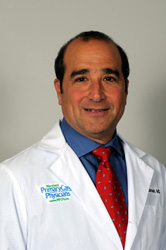Your annual check-up is for you. Here’s how to make it count.
Your annual physical is one of the best times to focus on your long-term health. Unlike sudden illnesses, this visit is entirely about your health goals, concerns, and preventative measures. It’s a chance to check in on your overall well-being, catch potential issues early, and make a plan to help you stay healthy and active for years to come. Keep in mind that your physical is a wellness-focused visit. If you’re dealing with new or urgent symptoms, it’s best to schedule a separate appointment so your provider can give it the full attention it needs.
A little preparation can go a long way in helping your provider see the full picture of your health and make the most of this once-a-year opportunity. Start with these simple steps:
- Bring your questions and health history. Be sure to write down any and all symptoms, lifestyle changes, concerns, or questions ahead of time so you don’t forget to mention them. Make note of your family health history, and if you see specialists, ask them to send over recent records so your provider has access.
- Review your medications and pharmacy information. Bring a list, or the actual bottles, of all prescription medications, supplements, or products you take. Know your preferred pharmacy in case any prescriptions need to be sent after your visit.
- Know your numbers. If you’ve recently had lab work done or are tracking blood pressure or glucose at home, bring those recent readings with you.
- Bring your insurance card, photo ID, and calendar. We’ll need to verify your information and take a photo for your MyChart account. Having your calendar handy makes it easy to schedule any follow-up appointments on the spot.
- Check what your insurance covers. Health insurance covers different parts of a physical depending on your plan. Don’t hesitate to ask about billing or why certain services might generate a separate charge. Learn more here.
- Ask if you need to fast. Some lab tests, like glucose or cholesterol, require you to avoid food or even caffeine for several hours beforehand. Be sure to check if you need to fast and if so, when to stop eating.
- Be honest. Your MPCP physician is here to help, not judge. Be open about habits like smoking, alcohol use, diet, and exercise so your doctor can give you the best, most accurate care.
A little preparation and thought into your health goals or concerns can make your visit more productive and more personal.
Need to schedule your next annual physical? Call your MPCP office today.






